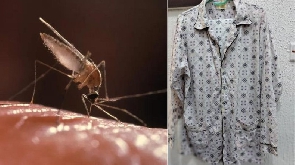 Professor Ladan tok say if pesin wear am at night mosquito no go bite am
Professor Ladan tok say if pesin wear am at night mosquito no go bite am
Malaria na common sickness for Nigeria wey don kill many pipo for many years now.
Di sickness don make pipo produce and create different tins, all to find how to stop am – but di sickness no dey go.
From anti-malaria medicines, to mosquito nets, repellent creams, insecticides and so on, malaria still dey catch Nigerians.
Na dis one make some researchers for Nigerian Universities come up wit anoda invention.
Some researchers from Kaduna State University and Bingham University invent cloth wey pesin go wear to pursue mosquitoes as di world dey continue to fight against Malaria.
According to latest wey World Health Organisation release to tok about Malaria dem say about 95% of 228 million cases of di sickness come from Africa and for di continent na 602,020 pipo die from am for 2021 alone.
Di lead researcher Professor Zakari Ladan of Pure and Applied Chemistry Department of Kaduna state University tell BBC News Pidgin say di cloth dey already treated wit anti mosquito compounds.
“With dis fabric pesin no go need any chemical insecticide again as far as you wear di fabric at night.”
According to Professor Ladan dem begin di work afta dem get grant wey support di cause for di year 2020.
On how di cloth dey take pursue mosquitoes to avoid bite wey dey ultimately lead to malaria, di professor tok say “di fabric dey work by slow release of di odorant fabric of di plant ingredients wey dey inside.
“If e pursue di mosquito no how wey e go fit bite you dat way malaria dey controlled.” di Professor yarn.
On whether pesin wey buy di cloth to prevent mosquito bite go fit wash am Professor Ladan tok say di strength go dey reduce.
“Yes it can be washed but like any fragrance, the strength dey reduces with time.”
“However, with stabilisers wey we used for di encapsulation, it fit take a minimum of three months and this also depend on the frequency of washing of di fabric.”
Di university don also tok about di need for continued cultivation of di plant Vitex Negundo wey dem use for dia research and how e fit turn to employment avenue for Nigerian youths.
On wen di cloth go dey available for pipo to buy, Professor Ladan say at di moment dem dey tok to entrepreneurs wey go take charge of mass production afta approval from relevant authorities.
“As soon as we get investors ready to take dis on before di end of dis year di product go boku for market.”
Other researchers for di project include Dr Bamidele Okoli, organic chemist from Bingham University, Dr Uju Ejike, a biochemist from Bingham University and Dr Mthunzi Fanyana, an expert in nanotechnology from Vaal University of Technology, South Africa.
'Death of my pikin change how I dey take eye see malaria’
"My dream na for Halima to grow up, go school and become medical doctor but malaria snatch her away from me and her mother.
“Di most painful part and wetin I dey always remember be say she die for my hands on our way to di hospital.”
Dat na how Sani Bature wey dey stay Kano for northwest Nigeria begin im tori to BBC News Pidgin of how malaria kill im five-months-old pikin Halima two years ago.
Sani say anytime e hear about di statistics for radio or television e dey remind am of im daughter and how she for don grow by now.
“Unlike bifor wey I no dey mind, now anytime I hear malaria stats for radio or TV e dey remind me of Halima and how she for don grow by now,” Sani tok.
“She don already learn to siddon and me and her dey play wella anytime I dey house.”
Wetin you need know about Malaria
For most cases, malaria dey transfer through di bites of female Anopheles mosquitoes - na more dan 400 different species of Anopheles mosquito dey, of which around 30 dey carry malaria.
Di mosquitoes wey dey spread di disease dey bite anytime but most times e dey come for night wen pipo dey sleep.
As 25 April na World Malaria Day, dis na wetin you suppose sabi about di disease:
Na four different types of Plasmodium parasite dey cause malaria: P. falciparum, P. malariae, P. ovale and P. vivax.
Di parasites dey pass from pesin to pesin through di bites of infected female Anopheles mosquitoes, wey dem call "malaria vectors".
Cases of malaria still on di rise for Nigeria?
Dr Usman Qalbusunnah na medical doctor for Rigasa General hospital for Kaduna state, northwest Nigeria and e say despite plenty efforts malaria still dey on di increase across di kontri.
“On a daily basis 60% of patients wey I dey attend to na malaria cases wey show say di illness still dey go up despite all efforts to end it.
“Anoda thing be say na di resistant form of malaria dey now wia be say treatment dey take longer in fact some patients go return to hospital after a week or two wit di same malaria symptoms.”